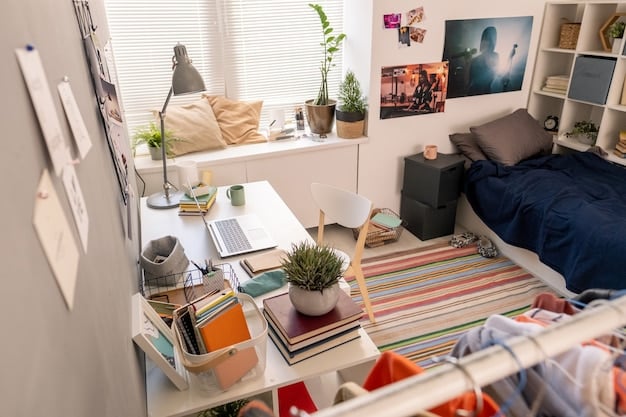Study Abroad: Maximize Your Experience & Minimize Costs

Study abroad programs offer invaluable opportunities for personal and academic growth, but understanding how to maximize the experience while minimizing costs is essential for a successful international adventure.
Embarking on a study abroad program can be a life-changing experience. However, the financial aspect can often seem daunting. This article provides practical strategies to help you make the most of your time abroad while keeping your expenses in check.
Planning Your Study Abroad Adventure: First Steps
Planning is key to both maximizing your experience and minimizing your costs when studying abroad. A well-thought-out plan will help you stay organized, make informed decisions, and avoid unnecessary expenses.
Researching Programs and Destinations
Start by researching different study abroad programs and destinations. Consider your academic goals, personal interests, and budget when making your selection. Look for programs that offer scholarships or financial aid.
Setting a Realistic Budget
Create a detailed budget that includes tuition, accommodation, flights, visa fees, insurance, meals, transportation, and personal expenses. Don’t forget to factor in potential unexpected costs. Be realistic about your spending habits and identify areas where you can save money.

Having a well-defined plan will not only save you money but also streamline your experience when abroad. The earlier you plan, the easier it will be.
- Compare program costs and find the most affordable options.
- Research the cost of living in your chosen destination.
- Look for early bird discounts and scholarships.
A well-planned study abroad experience ensures that you seize the learning opportunities and avoid unforeseen issues. This way you can get the most out of your experience and ensure that your funds are well allocated.
Finding Affordable Accommodation Options
Accommodation is often one of the most significant expenses when studying abroad. Exploring different options can help you find the best fit for your budget and lifestyle. Choosing the right accommodation can significantly impact student well-being too.
University Housing vs. Private Rentals
Consider living in university housing, as it is generally more affordable than private rentals. University dorms often include utilities and may offer meal plans. Alternatively, explore shared apartments or homestays to reduce costs.
Tips for Saving on Accommodation
Look for accommodation outside the city center, as rent tends to be lower. Consider living with roommates to split costs. Cook your own meals instead of eating out. Take advantage of free activities and events offered by the university or local community.

Choosing the right accommodation goes far beyond budget-friendly choices. It also ensures security, convenience, and a conducive environment for academic achievements.
- Research different neighborhoods and their average rental costs.
- Check for student discounts and subsidies.
- Read reviews and ask for recommendations from other students.
Choosing a lower cost location and saving in accommodation will improve well-being and mental clarity while abroad. Finding lower-cost living options can elevate your experience abroad.
Maximizing Academic Opportunities
Studying abroad is not just about sightseeing – it’s about enriching your academic experience. Take advantage of all the resources available to you to enhance your learning and make the most of your time in a new academic environment.
Engaging with Local Faculty and Resources
Attend lectures, seminars, and workshops offered by your host university. Participate in discussions and engage with local faculty. Use the university library and online resources to supplement your learning.
Taking Advantage of Cultural Experiences
Explore local museums, historical sites, and cultural events. Immerse yourself in the local culture and traditions. Participate in language exchange programs to improve your language skills. These experiences can enrich your understanding of the world and broaden your horizons.
Ensuring your college life enhances learning and grows your understanding of how things work will benefit you in the long term.
- Attend study sessions and form study groups with classmates.
- Seek out opportunities to conduct research or participate in academic projects.
- Visit local libraries and archives to deepen your knowledge of the local context.
Immerse yourself in the local culture and make the most of your learning experience, which can boost your academic performance. This way, you have more to show for your time abroad!
Managing Your Finances Wisely
Effective financial management is crucial to making your study abroad experience both affordable and enjoyable. Sticking to a budget, finding cost-effective options, and knowing how to manage your funds will result in a good experience.
Creating and Sticking to a Budget
Monitor your spending regularly and make adjustments as needed. Use budgeting apps or spreadsheets to track your expenses. Set spending limits for different categories, such as food, entertainment, and transportation.
Utilizing Student Discounts and Resources
Take advantage of discounts and deals offered by the host university, local businesses, and transportation providers. Look for free or low-cost activities and events in your area. Explore student resources such as food banks or financial aid programs.
By being wise with your spending and carefully allocating your money you can get to see the world and study without overspending.
- Open a local bank account to avoid international transaction fees.
- Use credit cards with no foreign transaction fees.
- Inform your bank and credit card companies about your travel dates to avoid having your cards blocked.
Managing your finances wisely will not only keep you on budget, it also ensures your well-being while enjoying your time abroad. Being smart and proactive about money ensures an amazing experience abroad.
Exploring Free and Low-Cost Activities
Studying abroad doesn’t have to be expensive. There are plenty of free and low-cost activities you can enjoy while immersing yourself in a new culture. The learning that comes from new experiences can enhance your study abroad experience.
Parks and Outdoor Spaces
Visit local parks, gardens, and natural attractions. Pack a picnic and enjoy a meal outdoors. Go for a walk or bike ride to explore the area. Hiking trails give you a free adventure.
Museums, Galleries, and Cultural Events
Look for free museum days or discounted admission for students. Attend local festivals, concerts, and art exhibitions. Visit historical landmarks and learn about the local history and culture.
Many free and low-cost programs can enhance your academic experience.
- Check for free walking tours and student-led excursions.
- Attend free lectures and workshops at the university.
- Volunteer in local community projects.
With a few options, experiences can be cheap, which will help with your time abroad. Engaging in the culture and seeing the sights can make this learning experience very valuable.
Overcoming Challenges and Staying Safe
Studying abroad comes with its own set of challenges, from cultural adjustments to safety concerns. Being prepared and proactive can help you navigate these challenges and have a safe and rewarding experience. Being aware of your surroundings is important.
Cultural Adjustment Tips
Be patient and open-minded as you adjust to a new culture. Join cultural exchange programs to meet locals and learn about their customs and traditions. Seek support from international student advisors or counselors if you’re feeling overwhelmed.
Safety Precautions
Stay aware of your surroundings and avoid walking alone at night. Keep your valuables secure and be cautious when using public transportation. Familiarize yourself with emergency contact information and local laws. It is also important to have contacts at your school.
While overseas it is important to be mindful of your health and stay safe.
- Register with your embassy or consulate.
- Learn basic phrases in the local language.
- Make copies of your important documents and keep them in a safe place.
Prioritizing and being proactive can have a huge impact on how you manage yourself while abroad. This will ensure that you have a valuable life experience.
| Key Point | Brief Description |
|---|---|
| 🚀 Planning Ahead | Early planning helps secure discounts and better options for accommodation. |
| 🏠 Affordable Housing | Choose university housing or shared rentals to minimize costs. |
| 💰 Budget Wisely | Stick to a strict budget and take advantage of student discounts. |
| 🎉 Free Activities | Explore free parks, museums, and cultural events to enrich your experience. |
Frequently Asked Questions
▼
It’s best to start planning at least 6-12 months in advance. This timeframe allows you to research programs, apply for scholarships, and secure necessary visas.
▼
Book flights well in advance, consider flying during off-peak seasons, and use flight comparison websites to find the best deals. Also, look into student travel agencies for discounts.
▼
You need comprehensive travel insurance that covers medical expenses, emergency evacuation, and loss of personal belongings. Some universities may offer or require specific insurance plans.
▼
Join student organizations, attend social events, participate in group activities, and be open to meeting new people from different backgrounds. Engage with local students as well.
▼
Acknowledge your feelings, stay connected with your support network, and engage in activities that help you adjust to the new environment. Talk to international student advisors for support.
Conclusion
By planning ahead, managing your finances wisely, and embracing new experiences, you can make the most of your study abroad program while keeping your costs down. Embrace the adventure, stay open-minded, and create memories that will last a lifetime.





